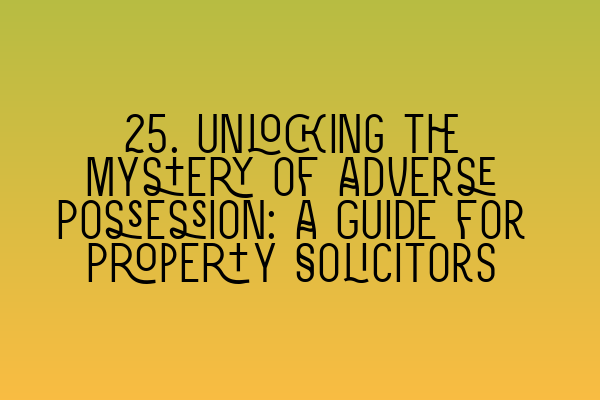Unlocking the Mystery of Adverse Possession: A Guide for Property Solicitors
Introduction
Adverse possession, also known as squatter’s rights, is a legal mechanism that allows a person to become the legal owner of a property through continuous and open possession for a specified period of time. As property solicitors, it is crucial to understand the intricate details of adverse possession to effectively advise your clients. In this guide, we will demystify adverse possession and provide you with the necessary knowledge to navigate this complex area of property law.
What is Adverse Possession?
Adverse possession refers to the acquisition of ownership rights in a property by a person who possesses it openly, continuously, and without the permission of the legal owner. In simpler terms, if someone takes possession of a property without the owner’s consent and maintains that possession for a certain period, they may have a legal claim to becoming the rightful owner.
Key Elements of Adverse Possession
To establish adverse possession, certain elements must be present. These elements include:
1. Actual Possession: The adverse possessor must physically possess the property, treating it as their own. Mere belief of ownership is not sufficient.
2. Open and Notorious Possession: The adverse possession must be visible and obvious to anyone who observes the property. It should not be hidden or secretive.
3. Exclusive Possession: The adverse possessor must exclude others, including the legal owner, from using the property during the possession period.
4. Continuous Possession: The adverse possession must be uninterrupted and continuous for the statutory period. Any temporary absences should not interfere with the overall continuity.
5. Adverse and Hostile Possession: The possession must be against the rights of the legal owner. This means the adverse possessor cannot have the owner’s consent or a legal right to occupy the property.
Statutory Requirements for Adverse Possession
The statutory period required for adverse possession varies from jurisdiction to jurisdiction. In England and Wales, the current statutory period is 10 years if the adverse possessor is registered with the Land Registry, or 12 years if they are not. It is essential to verify the specific requirements and timeframes applicable in your jurisdiction.
Application Procedure
As a property solicitor, you play a critical role in guiding your clients through the adverse possession process. The procedure generally involves:
1. Conducting Thorough Research: Start by researching the property’s ownership history, verifying legal titles, and examining any documentation related to previous ownership disputes.
2. Gathering Evidence: Collect all documentation and evidence that proves continuous, open, and exclusive possession of the property. This may include photographs, utility bills, tax records, and witness statements.
3. Providing Legal Advice: Advise your client on the probability of success and the potential risks involved in pursuing adverse possession. It is crucial to explain the complexities and uncertainties of this legal concept.
4. Drafting and Submitting an Application: Prepare a formal application to the Land Registry (or relevant authority in your jurisdiction) outlining the adverse possession claim, accompanied by the supporting evidence. Ensure the application meets all legal requirements and deadline.
5. Negotiating with the Legal Owner: Once the application is submitted, engage in negotiations with the legal owner if they raise objections. Attempt to reach a settlement or agreement that satisfies both parties’ interests.
6. Proceedings in Court: In case of a dispute, you may need to represent your client in court. Having a solid case supported by strong evidence will significantly increase the chances of a favorable outcome.
Conclusion
Adverse possession is a complex area of property law that requires a comprehensive understanding of its intricacies. As a property solicitor, it is crucial to navigate this subject matter with precision and expertise. By following the outlined steps and diligently fulfilling your role, you can provide invaluable guidance to your clients seeking to establish adverse possession rights.
Remember, it is always recommended to consult with a qualified property solicitor to ensure you are acting in accordance with the current laws and regulations governing adverse possession.
Related Articles:
– SQE 1 Practice Exam Questions: Test your knowledge of various legal concepts with our SQE 1 Practice Exam Questions.
– SQE 1 Practice Mocks FLK1 FLK2: Get prepared for the SQE 1 exam with our practice mocks designed to simulate the actual exam experience.
– SQE 2 Preparation Courses: Enhance your legal skills and knowledge with our comprehensive SQE 2 preparation courses.
– SQE 1 Preparation Courses: Prepare yourself for the SQE 1 exam by enrolling in our tailored preparation courses.
– SRA SQE Exam Dates: Stay updated on the latest SQE exam dates and plan your preparation accordingly.
